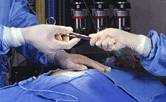
MONDAY, March 29 (HealthDay News) — Type 2 diabetics newly diagnosed with cancer have an increased risk of dying in the month following their cancer surgery, compared to people who are battling cancer alone.
This was particularly true for diabetics with colorectal or esophageal cancers, Johns Hopkins researchers found.
“Diabetes care should be part of cancer care,” said Hsin-Chieh “Jessica” Yeh, co-author of a study appearing in the April issue of Diabetes Care. “All the attention was on the cancer treatment and cancer care, and sometimes we overlook or forget about diabetes. This study suggests that diabetes is important for mortality, so it should be taken care of on top of the cancer care.”
But Dr. Martin S. Karpeh Jr., chairman of surgery at Beth Israel Medical Center and director of surgical oncology at Continuum Cancer Centers of New York, both in New York City, pointed out that elevated blood sugar levels — the prime characteristic of diabetes — is dangerous for people undergoing any type of surgery.
“The findings are completely consistent with other postoperative studies that have been published in recent years. We’ve known that an elevated blood sugar and diabetes increase the risk of mortality and complications from surgery,” he said. “They focused their analysis on cancer, but the same was found in non-cancer so I think the link is more with diabetes and surgery, regardless of what the reason for the surgery is.”
The bottom line for people with type 2 diabetes?
“Maintaining good health going into surgery is extremely important,” Karpeh said. “We need to emphasize the importance of good overall health. If you are a diabetic, maintaining a good blood sugar will help lower your risks of a bad outcome following any major surgery.”
People with diabetes have a higher risk of several other health conditions, including cancer, particularly of the breast, colorectal, endometrium, liver and pancreas.
Meanwhile, certain lifestyle factors, such as being overweight and sedentary, are risk factors for both type 2 diabetes and cancer.
These authors did a meta-analysis of 15 previous trials that had looked at cancer in diabetic patients.
Individuals who had been diagnosed with diabetes before their cancer surgery had a 50 percent higher chance of dying in the month after their operation compared with non-diabetic patients. This was after accounting for other factors.
There were no studies in the mix that looked at breast or endometrial cancer, so it could not be determined if there might be a link between these two as well.
It was unclear why this might be the case, but the authors had some hypotheses.
“Diabetes increases the risk of infection from surgery. High blood sugar and diabetes [increase] infections, period, with or without cancer,” said Yeh, who is an assistant professor of general internal medicine and epidemiology at Johns Hopkins University School of Medicine in Baltimore.
Also, she said, diabetes is a risk factor for cardiovascular disease and surgery increases the risk of blood clots, making diabetics doubly at risk for heart problems during surgery.
“What we would like to do [now] is set up research to test if better diabetes management can reduce the risk of mortality in cancer patients [undergoing surgery],” said Yeh.
More information
Visit the American Diabetes Association for more on living with diabetes.

